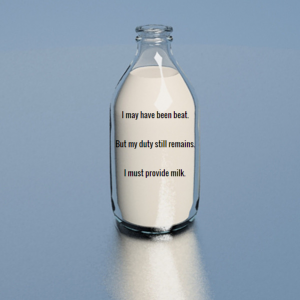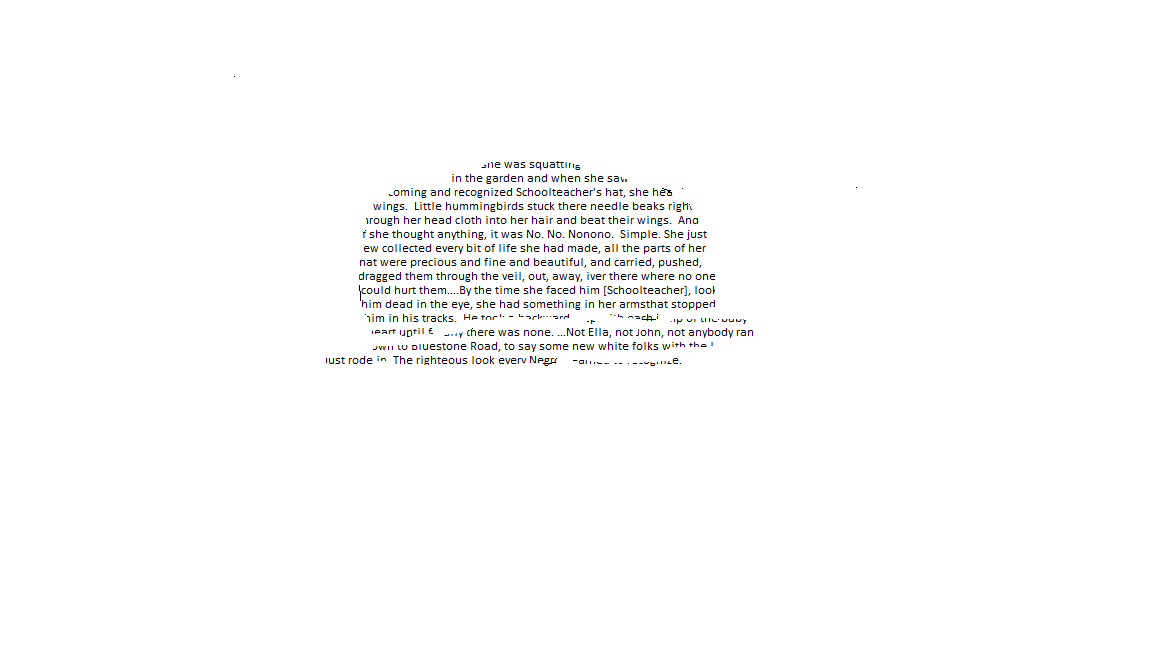In the novel Beloved written by Toni Morrison, a character named Sethe killed her first daughter, Beloved, to keep her away from slavery. She wanted to sacrifice all her children’s lives including herself to go onto the other side where her daughter was to get away Sweet Home (slavery). She wanted to keep her children from away that particular life. When Sethe’s daughter died, it broke her and it took a toll on her as if she wasn’t living anymore; the only thing that kept her going was the remaining children that were still alive. One major scene that occurred in the story is when Beloved returned. There was a dramatic change that happen to Sethe, Denver and Paul D’s life. Without her reappearance many events would not have taken place.
In this scene, Sethe realizes the girl she found after the carnival is a reincarnation of her daughter. She is able to put all the clues and hints together she was given from Beloved that she has come back to her.
Flies beat me to you. I would have known right away who you was when the sun blotted out your face the way it did when I took you to the grape arbor. I would have known at once when my water broke. The minute I saw you sitting on the stump, it broke. And when I did see your face it had more than a hint of what you would look like after all these years. I would have known who you were right away because the cup after cup of water you drank proved and connected to the fact that you dribbled clear spit on my face the day I got to 124… Otherwise I would have seen my fingernail prints right there on your forehead for all the world to see. From when I held your head up, out in the shed. And later on, when you asked me about the earrings I used to dangle for you to play with, I would have recognized you right off, except for Paul D. (Ch. 20 P.115 PDF)
When Sethe found Beloved by the grape arbor in the hot sun all day, right away Sethe had to use the bathroom to urinate. This was a symbol that showed what took place in the past when she had given birth to Beloved. It was as though Beloved was born again. This was an emblem of new life where Sethe gets the opportunity to live the life she had missed with her daughter Beloved. She explains she should have realized who Beloved was ever since the day she had given birth to her. She should have had a thought of what she should look like as Beloved got older. When it came down to the little things Beloved had done, when she dribbled clear spit on her face that should’ve given her a hint. That was an example of what babies do. However she was distracted by Paul D convincing her that Beloved was not her daughter. If it wasn’t for him, she would have figured it out by putting the clues together. Especially when it came down to Beloved asking Sethe about the earring she had in the past, on what she used as a toy to play with (Ch. 6 P.34 PDF). She should have known because not everyone knew about these things.
When the author states “flies beat me to you’, the author uses imagery on how long it took Sethe to realize the girl they found, Beloved, was her daughter she had killed. This quote shows a symbol of death with Beloved and Sethe. When Sethe killed her daughter, due to slavery, there was a part of Sethe that had died too. With Beloved coming back into the picture, all the thoughts that Sethe push to the back of her head were coming to reality. Beloved reincarnated is driving Sethe to face reality. The author shows a memory where Sethe has given birth to Beloved and reminisces about the things she has done when she was younger as if Sethe is given another chance to live again and be the mother she would have been.
In another scene, Beloved notices how close Paul D is with Sethe. It seems she does not like this and Beloved tries to do everything in her power to break them up.
SHE MOVED HIM. Not the way he had beat off the baby’s ghost–all bang and shriek with windows smashed and icily iars rolled in a heap. But she moved him nonetheless, and Paul D didn’t know how to stop it because it looked like he was moving himself. Imperceptibly, downright reasonably, he was moving out of 124.
Paul D stop sleeping in the same bed as Sethe. Beloved shifted his sleeping area in many different place from the rocker by the stove, Baby Suggs bed, until he was out onto the shed. He kept on moving because the place he was before was uncomfortable. This resulted in him not being able to manage to stay in one particular spot. It was as though she had ghostly powers over him taking control of him, not allowing him to move himself. However, there was not any evidence to show that Beloved was causing this problem. Every move he made was made as if he was doing it on his own, making his own decisions but he knew that was not the case. He knew Beloved played a big role of whatever unfamiliar thing that was going on with him, he just didn’t have a way to prove it.
Even though the author does not reveal if Beloved is the one playing a part of these bad situations that is happening to Paul D, none of these things would most likely not have occurred if Beloved never came into town.
Beloved dropped her skirts as he spoke and looked at him with empty eyes. She took a step he could not hear and stood close behind him. “She don’t love me like I love her. I don’t love nobody but her.” “Then what you come in here for?” “I want you to touch me on the inside part.” “Go on back in that house and get to bed.” “You have to touch me. On the inside part. And you have to call me my name.” …”Call me my name.” “No.” “Please call it. I’ll go if you call it.” (CH.11 P.67-68 PDF)
Beloved asks Paul D for him to sleep with her asking him to touch her on the inside part. I feel that Beloved is requesting this from Paul D because it would allow Sethe to love her more, as much as she loves her by breaking Paul D and Sethe apart. If this happens and Sethe finds out, he would not be able to come back into 124. With all of this happening, it causes Paul D to feel like he is not a man.
“Well, ah, this is not the, a man can’t, see, but aw listen here, it ain’t that, it really ain’t, Ole Garner, what I mean is, it ain’t a weak- ness, the kind of weakness I can fight ’cause ’cause something is happening to me, that girl is doing it, I know you think I never liked her nohow, but she is doing it to me. Fixing me. Sethe, she’s fixed me and I can’t break it.”…”Sethe, you won’t like what I’m ’bout to say.”…”Well, say it, Paul D, whether I like it or not.” Since he could not say what he planned to, he said something he didn’t know was on his mind. “I want you pregnant, Sethe. Would you do that for me?” (CH.13 P.72-73 PDF)
In this quote, Paul D is reciting to himself what exactly he going to say to Sethe when she gets off of work at the restaurant. He wanted to have a clean slate with Sethe by telling the truth on what was going on. He wants her to know that Beloved is making him sleep with her and is removing his manly ways. He could not stand up for himself. And sadly enough he was not able to man up enough to tell Sethe the truth about Beloved. Instead, he tells her he wants her pregnant.
Sethe became obsessed with Beloved wanted to give Beloved the world. She spends her last dime on her just to make up for old times. It was mandatory for her to please Beloved and if Beloved did not get her way, hell broke loose.
Anything she wanted she got, and when Sethe ran out of things to give her, Beloved invented desire. (Ch.26 P.135 PDF)
She would have never have been able to play the mother with her daughter Beloved. Although she had three other children to be a mother to, after infanticide her daughter, it was as though she had died and had nothing else to live for. By giving the chance to see and be with her daughter again. She was able to make up for the lost years. However, it ends up costing a lot on her part. She became obsessed with living by her daughter’s rule. She ends up losing her job and not being able to support her family anymore. Whatever Beloved asked or want it was given. This leads her second daughter Denver out to seek work by going back to her teacher asking for a job so she can be able to manage and provide for her family.
Somebody had to be saved, but unless Denver got work, there would be no one to save, no one to come home to, and no Denver either. It was a new thought, having a self to look out for and preserve. (Ch.26 P.142 PDF)
With Beloved’s return, it allowed Denver to grow and to mature into a young woman by taking on responsibility. She is doing everything that she could to help her mother and Beloved. Whenever food was given to them from a neighbor, she would share amongst them to eat. Denver knows something needed to be done in order for her mom to survive. Beloved was slowly killing her mother. According to this quote, if Denver never went out to help provide for her family, they would die. In that case, there would be no one to take care of.
If Beloved would have never came back into Sethe’s life, Sethe would not have had the second chance of playing a mother role to Beloved. With Beloved returning, Sethe is forced to remember her past. There’s a slight chance of her having less guilt because she is able to explain to her daughter what she had done, even though Beloved never questioned her about the situation once. When Beloved was gone, it was like she was dead, Sethe wanted to be with Beloved, however she knew she had kids that she needed to be there for too. Now with Beloved’s reappearance, this is like a new life and new beginning to Sethe to make up for everything she had missed or lost.







